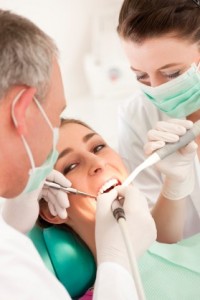 At Keldsen Family Dental Care, we know your dental health is closely connected to your overall health. We also know the mouth can oftentimes be the first place to indicate signs of health issues in the body. Recently, we found a helpful article that outlined seven warning signs that indicate it might be time to check in with Dr. Chris Keldsen and team.
At Keldsen Family Dental Care, we know your dental health is closely connected to your overall health. We also know the mouth can oftentimes be the first place to indicate signs of health issues in the body. Recently, we found a helpful article that outlined seven warning signs that indicate it might be time to check in with Dr. Chris Keldsen and team.
Flat, worn teeth plus headache (sign of stress)
Grind, grind, grind .... grind. If you live with a teeth grinder, you’re probably familiar with this unpleasant sound. Emotional or psychological stress can definitely contribute to teeth grinding. In addition, headaches, which are caused by spasms in the muscles, can radiate from the mouth and head down to the neck and upper back. Night guards, which we proudly provide at Keldsen Family Dental Care, may relieve the symptoms, as well as protect your teeth.
Cracking, crumbling teeth (sign of Gastroesophageal reflux disease)
As we age we may notice that the enamel on our teeth starts to chip at the edges of our front teeth or form hollowed out “wells” on the surface of our molars. These symptoms may be a sign of gastroesophageal reflux disease, or GERD, which is a chronic digestive disease that occurs when stomach acid—and occasionally, bile—flows back into your food pipe. Other signs and symptoms of GERD include acid reflux, dry mouth and heartburn.
Sores that won’t go away (sign of oral cancer)
More than 21,000 men and 9,000 women are diagnosed with oral cancer annually, according to the National Cancer Institute. Those most affected include the elderly (most are over the age of 60) and smokers. The survival rate for oral cancer is 35 percent. When an open sore in the mouth doesn't go away within a week or two, or when you experience unexplained bleeding or numbness, it’s always a good idea to visit Keldsen Family Dental Care so that we may rule out oral cancer. A lot of sores and ulcers may lurk underneath your tongue, where they are difficult to find.
Gums growing over teeth (sign of medication problems)
If you notice your gum growing over your tooth, and you're taking a prescribed or other medication, please give us a call as soon as possible. Certain medications may cause the gums to overgrow; the dosage will need to be adjusted, but it’s important we take a look.
Dry mouth (sign of Sjogren’s syndrome, diabetes)
Many things are known to cause dry mouth, but a lack of sufficient saliva is also an early warning of Sjogren's syndrome, as well as diabetes. According to the American Diabetes Association, 17 million Americans suffer from type 1 or type 2 diabetes, which is a metabolic disease caused by high blood sugar. Other signs of diabetes include excessive thirst, tingling in the hands or feet, frequent urination, blurred vision and weight loss.
Sjogren's syndrome, which affects approximately anywhere between 1-to-4 million Americans, causes white blood cells of the body attack—for unknown reasons—their moisture-producing glands. Symptoms also include dry eyes, as well as the mouth, but the rest of the body is affected by the disorder.
White webbing inside cheeks (sign of Lichen planus)
Lichen planus, whose cause is unknown, is an inflammatory skin disease that usually affects the skin, mouth, or both, according to the Mayo Clinic. On the skin it manifests with small purplish bumps while in the mouth it takes the appearance of a whitish, lacy pattern on the insides of the cheeks. The disease can't be passed from one person to another. Lichen planus may require relatively simple at-home care or no treatment. When symptoms are severe, such as pain or significant itching, please give us a call.
Crusting dentures (sign of pneumonia)
Older folks are known to inhale debris around the teeth and dentures, and inadvertently breathe in other materials into the lungs and airway, causing dangerous (even fatal) inflammation. Be sure to remove and wash dentures on a regular basis.
 In this season given to tidings of comfort and joy, and as our team at Keldsen Family Dental Care reflect on the year that was, we’d like to ask you, our wonderful patients: What do you love about the holidays this year? Being with your loved ones? A clean slate for 2012? Opening presents by the fireplace? All the delicious food? Also, what gift are you most looking forward to getting this year?
In this season given to tidings of comfort and joy, and as our team at Keldsen Family Dental Care reflect on the year that was, we’d like to ask you, our wonderful patients: What do you love about the holidays this year? Being with your loved ones? A clean slate for 2012? Opening presents by the fireplace? All the delicious food? Also, what gift are you most looking forward to getting this year?
 Even if you brush and floss daily, it is still important to see us at
Even if you brush and floss daily, it is still important to see us at  When your child needs urgent dental treatment, Dr. Chris Keldsen and our team at
When your child needs urgent dental treatment, Dr. Chris Keldsen and our team at  At
At